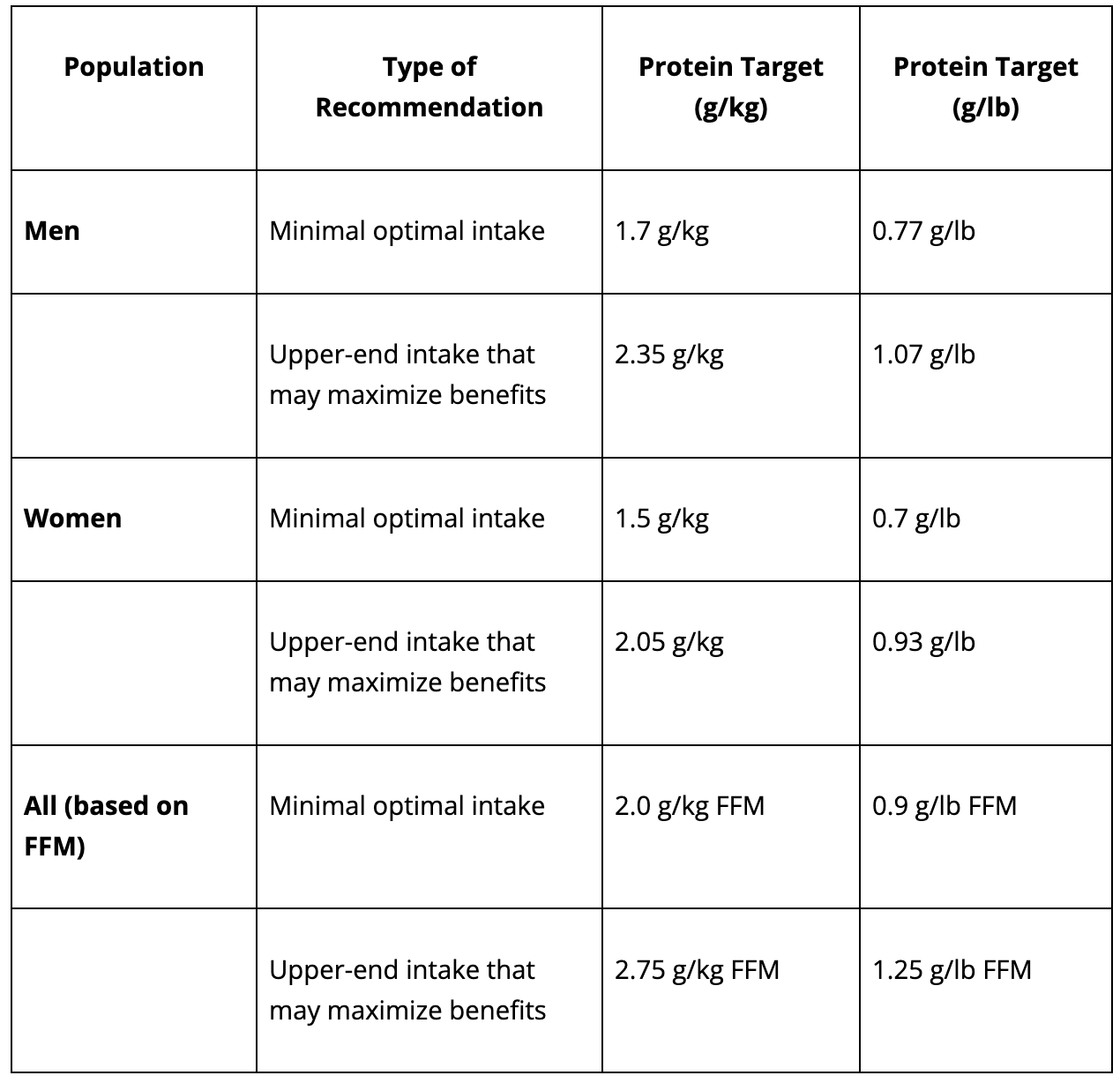Are You Eating Enough Protein? Here’s What The Research Really Says
Protein isn’t just for bodybuilders. It’s one of the most important nutrients for everyone - whether your goal is fat loss, muscle gain, maintenance, or simply staying healthy as you age.
Protein supports lean muscle tissue, hormone production, immune function, bone health, and helps keep you full and satisfied between meals. It plays a critical role in how your body looks, feels, and performs.
It’s especially important during fat loss goals, when we want to preserve lean muscle and manage hunger. But even outside of a calorie deficit, a higher protein intake supports better body composition, recovery, and long-term health.
So, knowing that protein is indeed important, the question becomes:
How much protein do we actually need to eat to get these benefits?
Let’s dive into what the research tells us and where it may be evolving.
FINDING YOUR PROTEIN SWEET SPOT:
The Old School Protein Recommendations
In 2018, a meta-analysis by Morton et al. reviewed the existing research on protein intake regarding gains and muscle growth. It’s one of the most commonly cited sources in nutrition and fitness today!
Their (previous) conclusion?
To maximize muscle growth, you should eat somewhere between:
- 1.6–2.2 grams of protein per kilogram of body weight
- For my imperial system readers, that’s roughly 0.74–1.0 grams per pound of body weight
This range became the gold standard for years. And one of the key takeaways was that anywhere in that range is sufficient (meaning that as long as you hit at least 1.6 g/kg, you likely get all the muscle-building and maintenance benefits protein has to offer).
But more recent analysis suggests there might be more to the story…
UNDERSTANDING UPDATED PROTEIN RECOMMENDATIONS
Greg Nuckols, a respected researcher and writer at Stronger by Science, took a deep dive into the original meta-analysis and came to a different conclusion.
According to his review, the original 1.6–2.2 g/kg range was likely too conservative. When you dig deeper into the data, the trend becomes clear: More protein generally leads to more muscle gain, though the benefits taper off as intake increases.
Rather than the relationship being flat across the 1.6–2.2 g/kg range, Nuckols found that the benefit continues to rise with higher intakes, just with diminishing returns. So while jumping from 1.0 to 1.5 g/kg might give you a big boost, going from 2.0 to 2.5 g/kg still helps - just a bit less noticeably.
Based on this updated interpretation of the research, here are the revised intake recommendations:
These targets provide a clearer framework, allowing for more personalized recommendations depending on your sex, goals, preferences, and current body composition.
And if you’re aiming to optimize fat loss, muscle retention, or strength gains—it’s often worth aiming toward the upper end of the range, especially if your training is intense or your calorie intake is low.
Using Fat-Free Mass to Estimate Protein Needs
There’s another takeaway here that can make protein recommendations even more accurate: basing them on fat-free mass (FFM) instead of total body weight.
Protein supports lean tissue, not fat mass. So, if someone has a higher body fat percentage, using total weight to set protein goals can lead them to overeat protein, which can feel challenging, unpleasant, and unsustainable in a way that leads to lower adherence and fewer benefits.
Let’s look at an example:
Female, 230 lbs, 34% body fat
Fat mass = 230 × 34% = 78.2 lbs
Fat-free mass = 230 – 78.2lb of fat mass = 151.8 lbs
Protein range (0.9–1.07g/lb FFM) = 136–162g/day
This is a much more reasonable protein range than using the 1g per pound rule, which would have her aiming for 230g/day.
Male, 275 lbs, 39% body fat
Fat mass = 275 × 39% = 107.25 lbs
Fat-free mass = 275 – 107.25 of fat mass = 167.75 lbs
Protein range (0.9–1.07g/lb FFM) = 151–180g/day
This is a much more reasonable protein range than using the 1g per pound rule, which would have him aiming for 275g/day.
Using fat-free mass helps those with higher body fat hit their protein needs without overdoing it, making their diet more realistic, flexible, and sustainable.
So, How Much Protein Should i Eat?
A high-protein diet is helpful no matter your goal: fat loss, muscle gain, maintenance, or long-term health.
The classic 1.6–2.2 g/kg (0.74–1.0 g/lb) range from the Morton et al. meta-analysis is still a great starting point. But as Greg Nuckols’ review points out, the higher end of that range—and even slightly above it—may offer more benefit, especially for maximizing muscle gains from strength training.
If you’re looking to refine things further, estimating your fat-free mass and using that to calculate protein needs can help you be even more accurate with your protein intake and keep you from unnecessarily eating too much protein.
And if you're still not sure what intake makes the most sense for you? That’s what we’re here for.
We believe that the best way to achieve your fat loss goals is working with a coach who creates a plan specific to you - your needs, your preferences, and your goals. A sustainable approach to our nutrition is essential to long-term habits and success. For high support coaching and guidance, apply for our 1:1 Nutrition Coaching here.



















